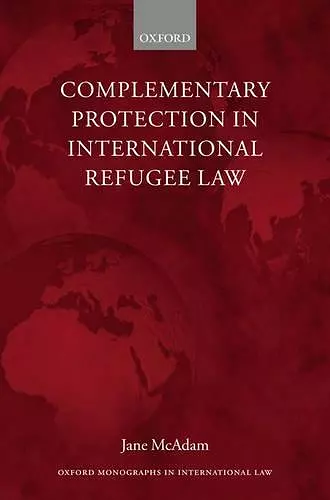Complementary Protection in International Refugee Law
Format:Hardback
Publisher:Oxford University Press
Published:22nd Feb '07
Currently unavailable, and unfortunately no date known when it will be back

This book represents an exciting new contribution to the field of refugee law and human rights law. It considers the legal obligations which countries have to people who do not meet the legal definition of a 'refugee', but who have nonetheless been forcibly displaced from their homes, whether due to war, generalized violence, humanitarian disaster or torture, inhuman or degrading treatment or punishment. This is known as 'complementary protection', because it complements the central international instrument in this area, the 1951 Refugee Convention. The book analyses international human rights law to discern where such legal obligations to protect might arise, and considers the legal status which countries ought to provide to such people. It provides a comprehensive overview of States' current responses to this issue, and offers original and thoughtful suggestions for protecting such persons within the international legal framework. This book is the first dedicated study on 'complementary protection' - the protection afforded by States to persons who need international protection but fall outside the legal definition of a refugee in article 1A(2) of the 1951 Refugee Convention. Human rights law has extended States' international protection obligations beyond the Refugee Convention, preventing States from removing individuals who would be at risk of serious harm if returned to their countries of origin. While a number of States have traditionally respected these additional human rights obligations, they have been reluctant to grant beneficiaries a formal legal status analogous to that enjoyed by Convention refugees. This book provides a comprehensive analysis of complementary protection, from its historical development through to its contemporary application. By examining the human rights foundations of the Convention, the architecture of Convention rights, regional examples of complementary protection, and principles of non-discrimination, the book argues that the Convention acts as a type of lex specialis for persons in need of international protection, providing a specialized blueprint for legal status, irrespective of the legal source of the protection obligation. Chapter 1 identifies pre-1951 examples of complementary protection, demonstrating how the content of the status afforded to extended categories of refugees was historically the same as that granted to 'legal' refugees. It traces unsuccessful attempts at the international and European levels to codify a system of complementary protection, prior to the EU's adoption of the...
This book is a laudable project, because it addresses an issue which is important both for practice and for theory. EU legislation and developments in case-law concerning general human rights instruments have changed the field in the past few years, hence a comprehensive study is timely...McAdam's book draws attention to an important issue. It is full of relevant information and insights. * Thomas Spijkerboer, Netherlands Quarterly of Human Rights, Vol 27/3, 2009 *
'this book has an important role in encouraging the reader to consider the extent to which the existing framework might be applied to emerging patterns of migration and displacement. McAdam provides a solid foundation for the future analysis of issues which have the potential to shape the ongoing development of complementary protection in international law.' * Modern Law Review 323, 325 *
An outstanding contribution to the literature [that] is necessary reading for anyone engaged with refugee protection today * UNSW Law Journal *
... a meticulously researched and carefully structured book, persuasively and elegantly written. * Peter Billings, 28 Legal Studies 143, 148 *
... a weighty analysis that covers a broad area of considerable topical interest * Professor Vaughan Lowe, Chichele Professor of International Law, University of Oxford *
McAdam writes very clearly: her lucid style makes her arguments very easy to follow, which is a real asset for an academic wishing to have an impact on law makers... McAdam's work is significant because of the unjust and arbitrary way in which Australia currently handles the compassionate and humanitarian claims of people who the system judges not to be refugees. This work provides a principles framework through which to approach the task of determining which non-refugees should be allowed to remain in Australia and what their base entitlements should be. * The Australian Yearbook of International Law, Volume 27 *
ISBN: 9780199203062
Dimensions: 240mm x 160mm x 26mm
Weight: 656g
322 pages